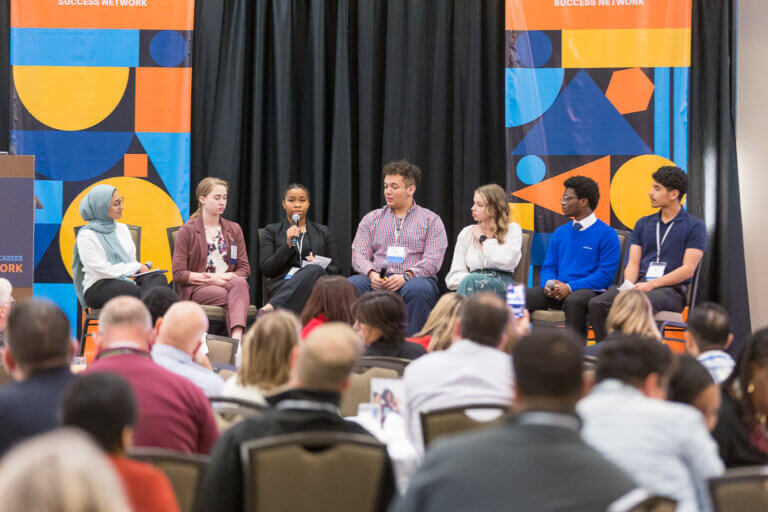New data from the Illinois State Board of Education (ISBE) on the endorsements awarded to the Class of 2024 demonstrate continued growth not only in students earning College and Career Pathway Endorsements (CCPE) but, perhaps more importantly, in the number of districts conferring endorsements. Since the 2016 Postsecondary and Workforce Readiness Act, as well as HB3296 (passed in 2022), EdSystems has sought out districts interested in implementing the endorsements, and the 2024 results continue the statewide trend of exponential scaling year over year.
Highlights From This Year’s College and Career Pathway Endorsements Data
Total CCPE Earners More Than Doubled Year-Over-Year
For the Class of 2024, 2,422 students earned an endorsement, up from 1,072 students in the Class of 2023.

Growth in CCPE Varies by Endorsement Area
When we analyze CCPE earners by their endorsement area, i.e., their industry sector concentration, the overall proportions are similar to those of previous years. Substantial numbers of students earn endorsements in health sciences and technology, human and public services, finance and business services, and manufacturing, engineering, technology, and trades.
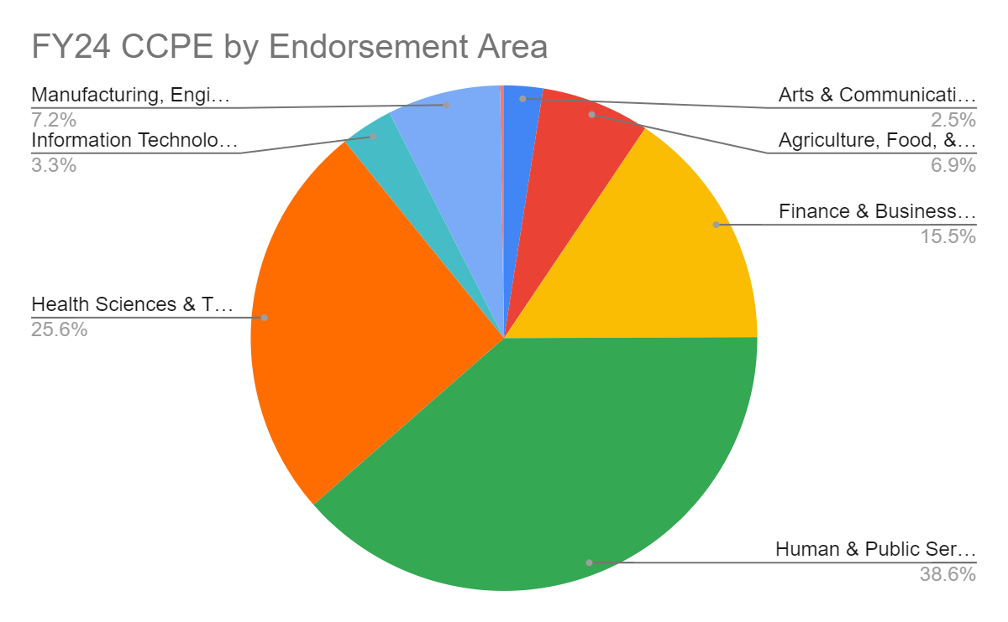
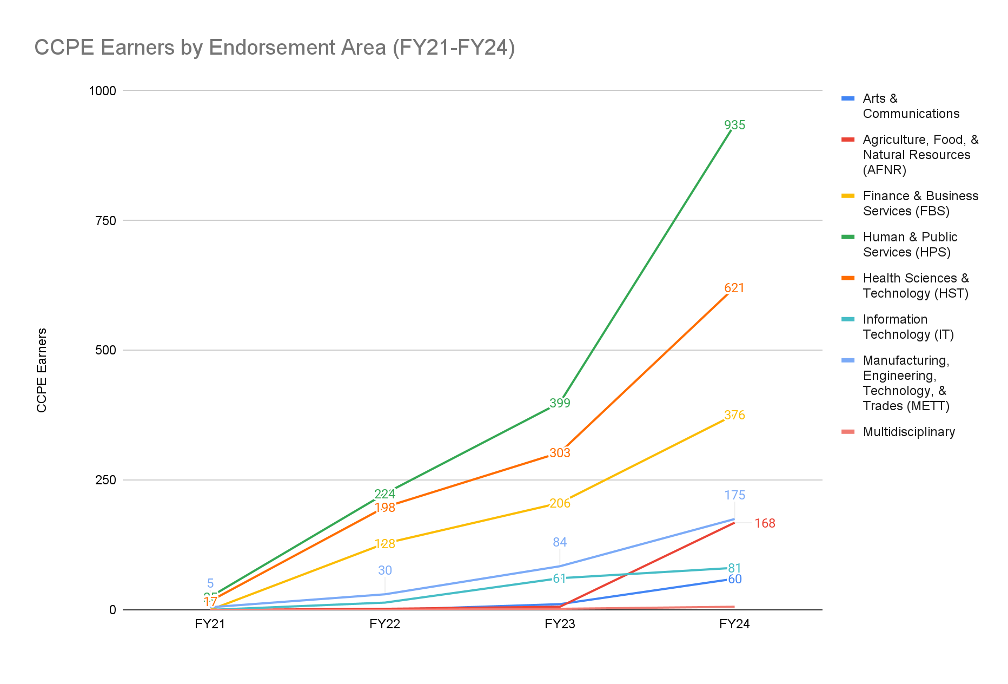
Taking a longitudinal view, we see growth across all endorsement areas, which is to be expected. However, in the change between the 2023 and 2024 school years, a few endorsement areas jump out as having the most significant gains, having more than doubled year-over-year:
- Agriculture, food, and natural resources: 168 CCPE up from 6 in 2023 (a 2,700% increase)
- Human and public services: Up to 935 earners from 399 (a 134%increase)
- Health sciences and technology: Up to 621 earners from 303 (a 105% increase)
- Manufacturing, engineering, technology, and trades: Up to 175 earners from 84 (a 108% increase)
We are celebrating this growth as it means that more students are having an opportunity to pursue a CCPE that aligns with their interests. Over the years, districts have been able to pursue and be supported by public and private funding for pathways in education, health sciences, IT, and manufacturing, all of which seem to be bearing fruit. However, seeing districts significantly scaling in other endorsement areas signals that communities are continuing to pursue implementation that aligns with their local needs beyond where statewide investments have been made.
141% Year-Over-Year Growth in Districts Conferring College and Career Pathway Endorsements
Perhaps more exciting than the growth in total students earning CCPE is the massive growth in districts conferring endorsements to their students. For the Class of 2023, 39 districts conferred the award. For the Class of 2024, this number more than doubled to 94 districts conferring endorsements, spanning the full breadth of the state.
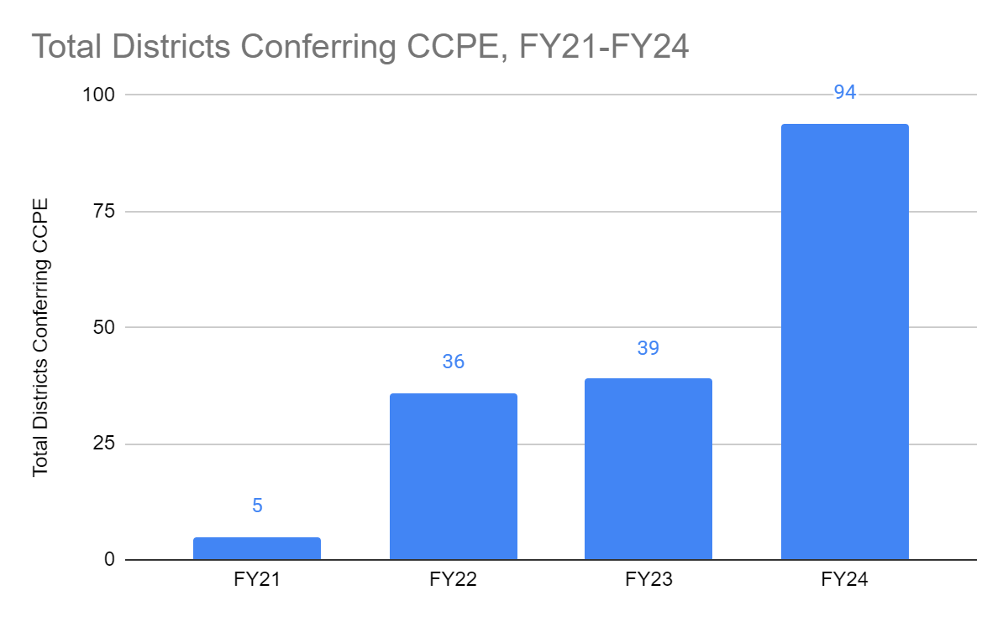
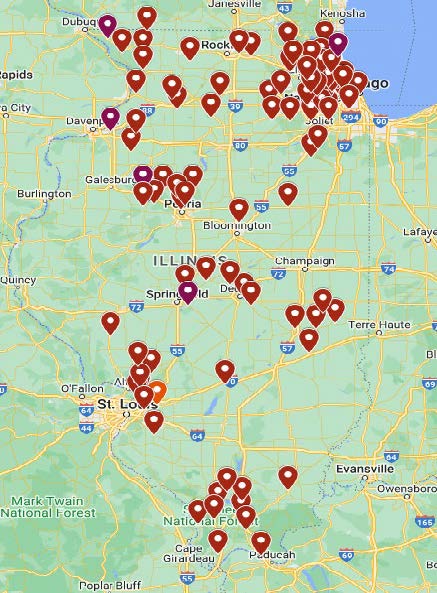
What Do We Still Want To Know?
While these data are rewarding to see, education leaders would benefit from seeing more detailed and disaggregated data that can help guide continuous improvement processes for districts and the state as a whole.
- Complete District Data: We encourage ISBE to provide the full list of districts that are approved to offer CCPE, as well as which endorsements they are approved to offer. The current count of 94 districts is only districts that have had at least one graduate earn a CCPE in a given year, which may mean more districts sought approval but did not have any eligible graduates for that particular year. To understand if the endorsement framework is being implemented with fidelity, it will be important to see if that becomes a trend in the same districts over time.
- Disaggregated Student Data: To drive conversations about equity and access, we need student-level data for endorsement earners that are disaggregated by demography. Until we have these data, we cannot know if endorsement opportunities are reaching students representing the diversity of our state, particularly those from historically marginalized communities.
Celebrating While Keeping an Eye on Challenges
Celebrating Innovation at Scale and Growing Resources
We are thrilled to celebrate the overall growth in CCPE earners, as well as the breadth of districts conferring endorsements across the state. For example, rural and suburban districts alike have been able to successfully implement pathways that align with the College and Career Pathway Endorsement framework.
- District 214, located in the northwest suburbs of Chicago, offers CCPE in almost every endorsement area. As an early adopter, they established a Pathway Development Process that includes guiding principles, an advisory team, research and evaluation processes, enhanced workplace learning opportunities, and more.
- Vienna High School, located in rural southern Illinois, has been recognized by ISBE for its CCPE-approved pathways in teacher education, social work, certified nursing, agriculture, mechanics, and construction craft. They offer numerous hands-on career-related courses and opportunities for students. The district has a comprehensive framework that allows students to continuously participate in course mapping and career planning with success coaches.
We are also celebrating additional implementation supports and resources being made available to districts statewide. ISBE has shared some important resources clarifying expectations for team-based challenges, which we have heard multiple districts mention as a barrier to securing approval to offer CCPE. Further, ISBE is offering a range of webinars, in-person workshops, and office hours to support districts as they work to develop their plans and secure approval for offering CCPE (check out ISBE’s CCPE landing page for more details on those opportunities).
We also hope that districts find the updated State of Illinois Model Programs of Study Guides and our quality criteria for pathways and work-based learning helpful in their planning processes.
Districts Still Face Challenges in Implementation
While there is much to celebrate, we know from conversations with leaders around the state that implementing CCPE still poses many challenges that include, but are not limited to:
- Being able to develop and deliver a robust continuum of work-based learning.
- Offering adequate career-focused courses for early college credit.
- Creating currency for endorsement earners at the state level, with employers and two- and four-year institutions.
- Accessing credentialed teachers in high-priority pathways.
As we support communities directly, we are exploring how we can also support ISBE to engage with these data and more to identify barriers to implementation. In particular, we want to work to ensure that districts across Illinois are implementing CCPE with fidelity and to ensure equitable access for their students.

